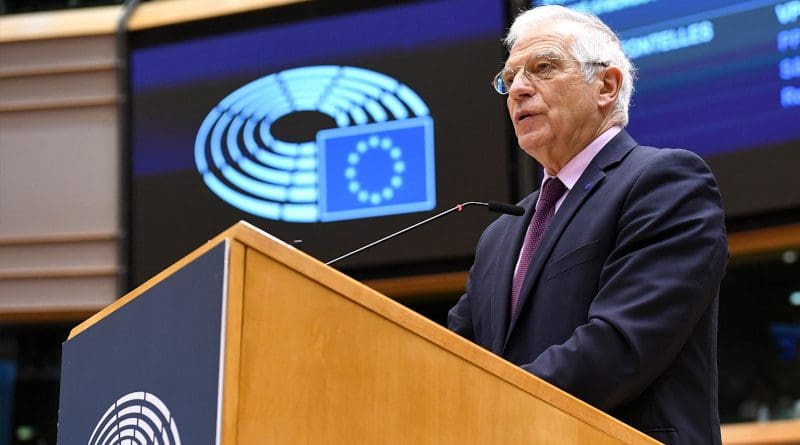Borrell Report Suggests New Carrot-And-Stick Approach For Turkey
By EurActiv
By Alexandra Brzozowski
(EurActiv) — Turkey will be invited to follow a path of dialogue and reap some economic benefits, or move further away from Europe and face consequences, the EU’s chief diplomat wrote in his Turkey report, set to be discussed by EU leaders later this week, according to a draft report seen by EURACTIV.
On Monday (22 March), EU foreign ministers are having a preliminary discussion about parts of the report, which includes the state of play in EU-Turkey political, economic and trade relations, before EU leaders discuss the way forward in relations with Ankara on Thursday.
“Since last December, Turkey has shown a calmer, more constructive attitude on various issues, including in its bilateral relations with several EU member states. These are positive and welcome steps forward,” the report states.
Borrell’s report, however, warns that “the process of de-escalation remains fragile” and thus calls for “more time to judge whether it is sustainable and credible and delivers lasting results, also in the light of the deteriorating domestic situation in Turkey”.
Erdoğan’s government withdrew from the Istanbul Convention on Saturday, a document committing signatories to prevent, prosecute, and eliminate domestic violence and promote equality.
The move was said to have largely irritated the EU and US, marking the second time in four days that Europe’s leaders have criticised Ankara over rights issues, after a Turkish prosecutor moved to close down a pro-Kurdish political party.
In another setback, diplomats from Turkey and fellow NATO member Greece failed to reach a breakthrough last week during the latest round of talks on their stand-off over eastern Mediterranean borders and energy rights.
At a summit in December, EU leaders postponed once again a decision to impose sanctions on Turkey for its “unauthorised” activities in the Eastern Mediterranean.
Borrell’s report again suggests adopting a ‘carrot-and-stick’ approach towards Ankara, by putting “a number of possible areas of cooperation on the table to allow for a progressive, proportionate and reversible approach”.
Those mostly economic incentives would include “a modernisation and expansion of the scope of the current EU-Turkey Customs Union” and support in economic reforms as well as “increasing people-to-people contacts is a further confidence-building measure” such as the participation in the next generation of EU programmes Erasmus+ and Horizon Europe.
“The Commission remains ready to advise Turkey on the specifics of the outstanding benchmarks defined in the Visa Liberalisation Roadmap,” the report also suggests.
The report also states that migration could be part of a more positive agenda with Turkey, especially a “more effective and mutually beneficial implementation” of the existing 2016 EU-Turkey deal on migration.
Sanctions
It, however, provides some sticks in case Turkey does “not move forward constructively in developing a genuine partnership with the EU, but instead return to renewed unilateral actions or provocations.”
Those would involve “smart, scalable yet reversible restrictive measures, building on those in place” and could be expanded to include legal entities or “measures targetting other sectors important for the Turkish economy, such as a prohibition to supply of tourism services, negative travel advice by member states etc.”
Such sectoral sanctions would have to be agreed by all EU countries.
The measures are also meant to be reversible in order to “adapt to the situation and the level of threat or challenge in the best possible manner, incentivise a return to a cooperative track and avoid a negative escalation dynamic”, the report concludes.
EURACTIV has learnt that Athens is satisfied with the report and only displeased by its failure to mention Turkey’s casus belli with Greece.
Turkey has for decades disputed Greece’s rights in the Aegean Sea. The Turkish parliament declared 25 years ago that any extension of territorial waters from Greece’s side will be considered an act of war.
However, EU diplomats are not convinced there can be a positive breakthrough in the relations any time soon.
“Turkey’s actions have improved, but there is still lots to do,” a senior EU official told reporters last Thursday, adding that there is still a wide range of issues standing in their way.
On Friday, Turkish President Recep Tayyip Erdoğan held a video conference with European Council President Charles Michel and Commission President Ursula von der Leyen.
“They also discussed a possible visit to Turkey following the March EU summit”, the short EU statement said, signalling that Erdoğan, who insists on a summit with EU leaders, has received another carrot from Brussels.
Joint approach
The December summit conclusions had suggested that Europe should wait for the new US administration in order to align its approach to the issue with Washington.
Sources close to the matter suggest that the new US administration has told Europeans to keep a low profile with Ankara and avoid the risk of pushing it toward Moscow.
“Considering that Biden is not planning to have as good relations as Trump had with Saudi Arabia, there will be none to counter-balance Turkey. So, Turkey must come closer to the West,” another EU source said.

